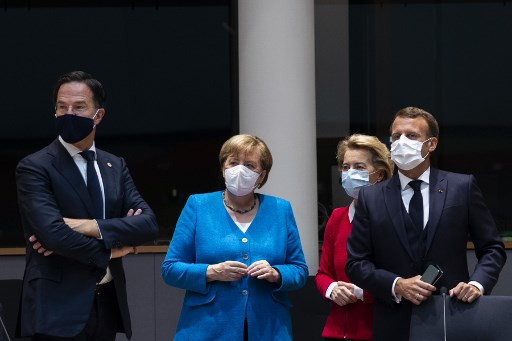Popular Reads
Top Results
Can't find what you're looking for?
View all search resultsPopular Reads
Top Results
Can't find what you're looking for?
View all search resultsWinners and losers in EU's big stimulus deal
It is very hard to deny that the painstakingly negotiated deal is a victory for backers of a more centrally-run or federal Europe, most notably French President Emmanuel Macron.
Change text size
Gift Premium Articles
to Anyone
 Netherlands' Prime Minister Mark Rutte (left) looks on next to Germany's Chancellor Angela Merkel (second left), President of the European Commission Ursula von der Leyen (second right) and France's President Emmanuel Macron prior the start of the European Council building in Brussels, on July 18, 2020, as the leaders of the European Union hold their first face-to-face summit over a post-virus economic rescue plan. (Pool/AFP/Francisco Seco)
Netherlands' Prime Minister Mark Rutte (left) looks on next to Germany's Chancellor Angela Merkel (second left), President of the European Commission Ursula von der Leyen (second right) and France's President Emmanuel Macron prior the start of the European Council building in Brussels, on July 18, 2020, as the leaders of the European Union hold their first face-to-face summit over a post-virus economic rescue plan. (Pool/AFP/Francisco Seco)
A
fter four days of squabbling there is a little something for everyone in the 750-billion-euro recovery package agreed by EU leaders -- but the details reveal real winners and losers.
Winners
More 'Europe': It is very hard to deny that the painstakingly negotiated deal is a victory for backers of a more centrally-run or federal Europe, most notably French President Emmanuel Macron.
In 2017, the leader eschewed "La Marseillaise" and marched solemnly to his inaugural address to the air of the EU anthem "Ode of Joy".
A speech at la Sorbonne University quickly followed that unfurled a hugely ambitious vision for Europe, with myriad proposals for deepening the EU project that most saw as far-fetched.
The Netherlands and other countries that would prefer a "small" Europe successfully stonewalled Macron's desire, until the virus crisis forced them to accept joint borrowing to finance the rescue package.
Spain and Italy: The first tragic scenes of pandemic in Europe came from Italy and Spain, with hospitals overrun and death rates skyrocketing.
Calls from Rome and Italy for "solidarity" quickly followed, but northern Europe firmly quashed any talks of joint borrowing or anything that reeked of sending tax revenue from one EU country to the other.
But no one had counted on a sea change in Germany, where Chancellor Angela Merkel allied herself with Macron to back 500 billion euros in joint borrowing to help the hardest-hit by the pandemic.
Now, tens of billions will be heading out -- despite the furious pushback by the "Frugals", the Netherlands, Sweden, Denmark and Austria -- that said they would refuse any penny in direct aid to their partners.
In the end, after the fighting, a total of 390 billion euros will be distributed in direct aid.
The climate cause: About one third of the EU's stimulus stash will be earmarked for fighting climate change, making it one of the biggest green deals anywhere in history.
National governments will be asked to submit climate-friendly projects involving electric cars, energy efficiency, and renewable power.
Brussels: Another winner will be the European Commission, the bloc's executive arm, which will be in charge of deciding how the money will be disbursed.
The level of involvement of the EU in the oversight of national spending will be unprecedented, with the exception of bailouts of Greece, Portugal or Ireland during the debt crisis.
Losers
EU budget: The largesse of the recovery fund is coming in part by starving the normal EU budget that was also negotiated at this weekend's marathon summit.
Some call it robbing Peter to pay Paul: research, a transition fund for climate change and an EU investment fund have all been gutted of original proposals.
The EU's landmark Erasmus program for young people is also stripped, drawing a furious response from the European Parliament, which will have to ratify the plan this year.
Much of this is to pay for the recovery fund as well as fork out tens of billions of euros in rebates to the frugals, who were finally quieted with substantial returns in cash on their EU contributions.
Digital tax: The EU's proposal to leaders had included an unprecedented ambition to raise EU taxes through various means: including a special tax on tech giants or a carbon tax. In the end, none of these was finalized and the recovery fund will need to be repaid by the EU budget over decades to come.
To be determined
Orban: An hour before the final deal was announced, media close to Hungarian Prime minister Viktor Orban said the EU had abandoned all plans to link EU disbursements to adherence to European rules on media freedom and the independence of the judiciary.
EU negotiators however insist this is not the case and that Brussels will submit a plan to make the link explicit. Only time will tell whether Brussels is able to bring their plan to fruition.
"Whether or not the mechanism will bite will depend on its design -- and all countries will still have to agree to it," warned Lucas Guttenberg of the Jacques Delors Center in Berlin.









